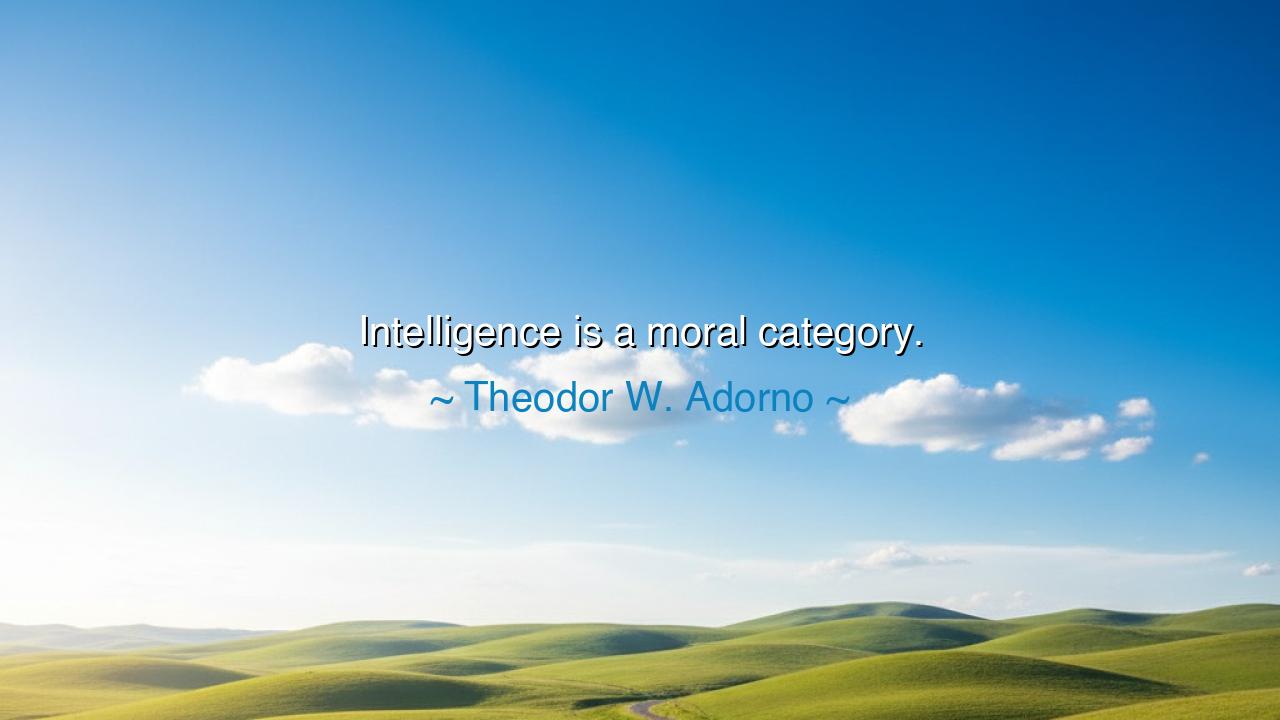
Intelligence is a moral category.






In the words of Theodor W. Adorno, philosopher of the mind and critic of modernity, there rings a truth that pierces both intellect and conscience: “Intelligence is a moral category.” At first glance, these words may seem strange — for we are taught that intelligence belongs to the mind, and morality to the heart. Yet Adorno, who lived through the dark crucible of the twentieth century, saw clearly that the two cannot be separated. He spoke not of cleverness, nor of cunning calculation, but of an intelligence guided by conscience, an understanding of the world that carries within it the weight of responsibility. To be truly intelligent, he reminds us, is not merely to know — but to know rightly, and to act upon that knowledge with integrity.
Adorno’s words were born in an age when intellect was misused to justify horror. He lived in the aftermath of World War II, when the tools of reason — science, bureaucracy, and order — had been twisted into instruments of destruction. The Holocaust was not the work of savages, but of educated men, engineers, and philosophers who turned their minds toward evil. Thus, Adorno declared that intelligence divorced from morality is not true intelligence at all. Knowledge without conscience is like a sword in the hands of a child — sharp, dazzling, and deadly. In this sense, his quote is both a warning and a call: that to think clearly, one must also feel deeply.
Throughout history, this truth has revealed itself again and again. Consider the story of J. Robert Oppenheimer, the physicist who gave the world the atomic bomb. His mind was brilliant beyond measure, yet when he saw the fire of his creation devour cities, he whispered, “Now I am become Death, the destroyer of worlds.” In that moment, he understood Adorno’s truth — that intelligence, when severed from morality, becomes monstrous. The true test of the mind is not in how much it can achieve, but in whether it can restrain itself from achieving what it should not.
Adorno’s teaching carries a flame of ancient wisdom. In the East, Confucius taught that knowledge without virtue leads to chaos, and in the West, Socrates proclaimed that wisdom is knowing the good. Both would have nodded to Adorno’s words, for they understood that intelligence is not simply the accumulation of facts, but the cultivation of discernment — the ability to distinguish not merely between truth and falsehood, but between right and wrong. The mind, unanchored by morality, becomes a wandering ship lost at sea; only the compass of ethics can guide it toward meaning.
In the modern world, where brilliance is measured in speed and innovation, this teaching is more vital than ever. We build machines that think, algorithms that decide, and weapons that act faster than reflection allows. Yet in this race toward power, we must ask: to what end? Adorno’s voice rises like an ancient bell amid the noise of progress — reminding us that the measure of a mind is not its cleverness, but its compassion. Intelligence, he insists, is not a cold mechanism but a living virtue, one that must be guided by empathy, justice, and the courage to resist what is wrong even when it is convenient.
The lesson, then, is this: cultivate a mind that serves the heart. Let your intelligence not be a tool of ambition, but a servant of goodness. Question not only what can be done, but what should be done. Read deeply, think boldly, but never let your thoughts lose their humanity. For every act of cruelty in history was once justified by a clever thought — and every act of greatness was born from a moral one. To be intelligent, therefore, is to bear responsibility; to think is to choose.
So, my child of learning and light, remember Adorno’s wisdom: “Intelligence is a moral category.” Guard your mind as you would a sacred flame. Feed it with truth, but temper it with compassion. Let it be the sword that defends, not destroys; the lamp that illuminates, not blinds. For the greatest minds of the earth are not those who have built empires or machines — but those who have lifted the soul of humanity through the marriage of thought and virtue, of knowledge and conscience, of intelligence and morality.






AAdministratorAdministrator
Welcome, honored guests. Please leave a comment, we will respond soon